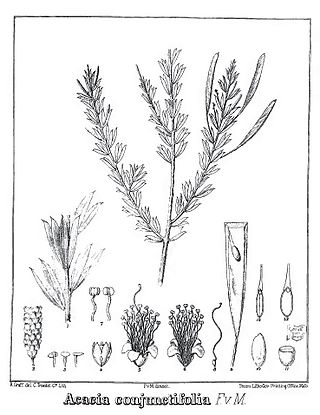Acacia anastomosa, also known as Carson River wattle, is a shrub belonging to the genus Acacia and the subgenus Juliflorae that is endemic to north western Australia.

Acacia aptaneura, commonly known as slender mulga, is a shrub belonging to the genus Acacia and the subgenus Juliflorae. It is native to central and western parts of Australia.

Acacia chrysochaeta is a shrub belonging to the genus Acacia and the subgenus Juliflorae that is endemic to a small area of north western Australia.

Acacia conjunctifolia is a shrub belonging to the genus Acacia and the subgenus Juliflorae. It is native to parts of northern Australia.

Acacia effusifolia is a shrub or tree belonging to the genus Acacia and the subgenus Juliflorae. It is native to an area in the Mid West and the Wheatbelt regions of Western Australia.

Acacia gibbosa is a shrub or tree belonging to the genus Acacia and the subgenus Juliflorae native to Western Australia.

Acacia hamersleyensis, also known as Karijini wattle or Hamersley Range wattle, is a tree or shrub belonging to the genus Acacia and the subgenus Juliflorae. It is endemic to a small area in central Western Australia.

Acacia latior is a shrub belonging to the genus Acacia and the subgenus Juliflorae that is endemic to western Australia.

Acacia levata is a shrub belonging to the genus Acacia and the subgenus Juliflorae that is endemic to small arid area of western Australia.

Acacia mulganeura, commonly known as milky mulga and hilltop mulga, is a tree or shrub belonging to the genus Acacia and the subgenus Juliflorae that is endemic to arid parts of central and western Australia.

Acacia orthocarpa, also commonly known as Pilbara weeping wattle, needle-leaf wattle or straight-podded wattle, is a shrub or tree belonging to the genus Acacia and the subgenus Juliflorae that is endemic to tropical parts of northern Australia. The indigenous Nyangumarta peoples know it as yartupu.

Acacia repanda is a shrub belonging to the genus Acacia and the subgenus Juliflorae that is endemic to a small area in western Australia.

Acacia rhodophloia, commonly known as minni ritchi or western red mulga, is a tree or shrub belonging to the genus Acacia and the subgenus Juliflorae that is endemic to a large area of arid central western Australia. The Indigenous group the Kurrama peoples know the plant as mantaru.

Acacia richardsii is a shrub belonging to the genus Acacia and the subgenus Juliflorae that is endemic to north western Australia.

Acacia sibina is a tree or shrub belonging to the genus Acacia and the subgenus Juliflorae the is endemic to parts of western Australia.
Acacia sulcaticaulis, also commonly known as the Mount Mulgine fluted wattle, is a shrub or tree belonging to the genus Acacia and the subgenus Juliflorae that is native to a small area in western Australia.

Acacia tetraneura is a shrub belonging to the genus Acacia and the subgenus Juliflorae that is endemic to western Australia.

Acacia yorkrakinensis is a shrub belonging to the genus Acacia and the subgenus Juliflorae that is native to Western Australia.

Acacia vittata, commonly known as Lake Logue wattle, is a shrub of the genus Acacia and the subgenus Plurinerves that is endemic to a small area in western Australia.

Acacia warramaba is a shrub of the genus Acacia and the subgenus Plurinerves that is endemic to an area of south western Australia.



















